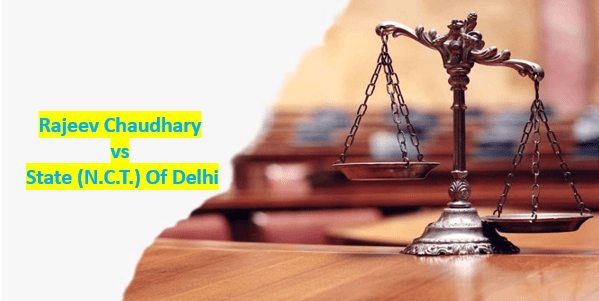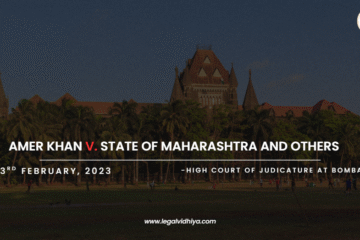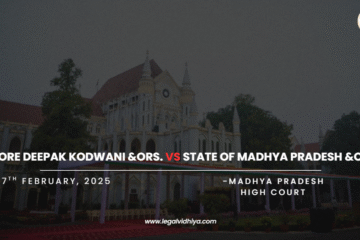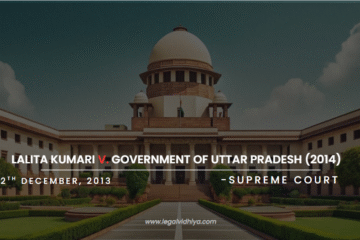
IN THE SUPREME COURT OF INDIA
Rajeev Chaudhary -Petitioner
State(N.C.T) of Delhi -Respondent
BENCH:M.B. Shah & S.N. Variava

Fact of the case
Appellant was arrested in connection with an offence punishable under Sections 386, 506 and 120-B of the I.P.C. He was produced before the Metropolitan Magistrate, Delhi on 31.10.1998 and was released on bail by order dated 2.1.1999 by the Metropolitan Magistrate on the ground that charge-sheet was not submitted within 60 days as provided under Section 167(2) of the Criminal Procedure Code, 1973. That order was challenged before the Sessions Judge, New Delhi by filing Criminal Revision No.22 of 1999. By judgment and order dated 18.8.1999, the Additional Sessions Judge, New Delhi allowed the said revision application. The learned Additional Sessions Judge held that for an offence under Section 386 IPC, period of sentence could be up to 10 years RI. Hence, clause (i) of the proviso (a) to Section 167 (2) would be applicable. He, therefore, set aside the order passed by the Metropolitan Magistrate releasing the accused on bail. That order was challenged before the High Court by the accused. The High Court referred to its earlier decisions and held that expression an offence punishable with imprisonment for a term of not less than 10 years in clause (i) of the proviso to Section 167 would mean an offence punishable with imprisonment for a specified period which period would not be less than 10 years or in other words would be at least ten years. The words not less than qualify the period. These words put emphasis on the period of ten years and mean period must be clear ten years. It was further held that on a plain reading of clause (i) of proviso (a) to sub-section (2) of Section 167 Cr. P.C., there seemed to be no doubt that offences punishable with death, imprisonment for life or imprisonment for a term of ten years or more would fall under clause (i) and offences which are punishable with imprisonment for less than ten years would fall under clause (ii). Hence, the High Court set aside the order passed by the Additional Sessions Judge. That order is challenged in this appeal.
Section 167 is a provision which authorises the Magistrate permitting detention of an accused in custody and prescribing the maximum period for which such detention could be ordered pending investigation. We are concerned with the interpretation of proviso (a) of Section 167(2) which reads thus:-
167. Procedure when investigation cannot be completed in twenty-four hours.
(2)Provided that
(a) the Magistrate may authorise the detention of the accused person otherwise than in the custody of the police, beyond the period of fifteen days, if he is satisfied that adequate grounds exist for doing so, but no Magistrate shall authorise the detention of the accused person in custody under this paragraph for a total period exceeding,
(i) ninety days, where the investigation relates to an offence punishable with death, imprisonment for life or imprisonment for a term of not less than ten years;
(ii) Further, Section 386 of I.P.C. provides as under:
386. Extortion by putting a person in fear of death or grievous hurt. Whoever commits extortion by putting any person in fear of death or of grievous hurt to that person or to any other, shall be punished with imprisonment of either description for a term which may extend to ten years, and shall also be liable to fine.
Issues involved
In this case the question arises was as follows
- Whether the period of detention for more serious offences can be the same as for others?
- Whether the provisions of Section 167 CrPC are maintained by the sessions?
Legal provisions
- Section 167 under the Code of Criminal Procedure
Legal Reasoning
Section 167 CrPC
Procedure when investigation cannot be completed in twenty four hours.
(1) Whenever any person is arrested and detained in custody and it appears that the investigation cannot be completed within the period of twenty- four hours fixed by section 57, and there are grounds for believing that the accusation or information is well- founded, the officer in charge of the police station or the police officer making the investigation, if he is not below the rank of sub- inspector, shall forthwith transmit to the nearest Judicial Magistrate a copy of the entries in the diary hereinafter prescribed relating to the case, and shall at the same time forward the accused to such Magistrate.
(2) The Magistrate to whom an accused person is forwarded under this section may, whether he has or has not jurisdiction to try the case, from time to time, authorise the detention of the accused in such custody as such Magistrate thinks fit, for a term not exceeding fifteen days in the whole; and if he has no jurisdiction to try the case or commit it for trial, and considers further detention unnecessary, he may order the accused to be forwarded to a Magistrate having such jurisdiction: Provided that-
(a) 1 the Magistrate may authorise the detention of the accused person, otherwise than in the custody of the police, beyond the period of fifteen days; if he is satisfied that adequate grounds exist for doing so, but no Magistrate shall authorise the detention of the accused person in custody under this paragraph for a total period exceeding,-
(i) ninety days, where the investigation relates to an offence punishable with death, imprisonment for life or imprisonment for a term of not less than ten years;
(ii) sixty days, where the investigation relates to any other offence, and, on the expiry of the said period of ninety days, or sixty days, as the case may be, the accused person shall be released on bail if he is prepared to and does furnish bail, and every person released on bail under this sub- section shall be deemed to be so released under the provisions of Chapter XXXIII for the purposes of that Chapter;]
(b) no Magistrate shall authorise detention in any custody under this section unless the accused is produced before him;
(c) no Magistrate of the second class, not specially empowered in this behalf by the High Court, shall authorise detention in the custody of the police.
Explanation I.- For the avoidance of doubts, it is hereby declared that, notwithstanding the expiry of the period specified in paragraph (a), the accused shall be detained in custody so long as he does not furnish bail;].
Explanation II.- If any question arises whether an accused person was produced before the Magistrate as required under paragraph (b), the production of the accused person may be proved by his signature on the order authorising detention.]
(2A) 1 Notwithstanding anything contained in sub- section (1) or sub- section (2), the officer in charge of the police station or the police officer making the investigation, if he is not below the rank of a sub- inspector, may, where a Judicial Magistrate is not available, transmit to the nearest Executive Magistrate, on whom the powers of a Judicial Magistrate or Metropolitan Magistrate have been conferred, a copy of the entry in the diary hereinafter prescribed relating to the case, and shall, at the same time, forward the accused to such Executive Magistrate, and thereupon such Executive Magistrate, may, for reasons to be recorded in writing, authorise the detention of the accused person in such custody as he may think fit for a term not exceeding seven days in the aggregate; and, on the expiry of the period of detention so authorised, the accused person shall be released on bail except where an order for further detention of the accused person has been made by a Magistrate competent to make such order; and, where an order for such further detention is made, the period during which the accused person was detained in custody under the orders made by an Executive Magistrate under this sub- section,
Judgement
From the relevant part of the aforesaid sections, it is apparent that pending investigation relating to an offence punishable with imprisonment for a term not less than 10 years, the Magistrate is empowered to authorise the detention of the accused in custody for not more than 90 days. For rest of the offences, period prescribed is 60 days. Hence in cases, where offence is punishable with imprisonment for 10 years or more, accused could be detained up to a period of 90 days. In this context, the expression not less than would mean imprisonment should be 10 years or more and would cover only those offences for which punishment could be imprisonment for a clear period of 10 years or more. Under Section 386 punishment provided is imprisonment of either description for a term which may extend to 10 years and also fine. That means, imprisonment can be for a clear period of 10 years or less. Hence, it could not be said that minimum sentence would be 10 years or more. Further, in context also if we consider clause (i) of proviso (a) to Section 167(2), it would be applicable in case where investigation relates to an offence punishable (1) with death; (2) imprisonment for life; and (3) imprisonment for a term of not less than ten years. It would not cover the offence for which punishment could be imprisonment for less than 10 years. Under Section 386 of the IPC, imprisonment can vary from minimum to maximum of 10 years and it cannot be said that imprisonment prescribed is not less than 10 years.
In the result, the appeal is dismissed
Conclusion
In my opinion the judgement made by the sessions court was wrong as mentioned by the High Court and the Supreme Court. Section 386 is a very serious offence which can be punishable up to 10 years or more than. So the period of legal detention must be up to 90 days.
written by SHERIN MOIDU C intern under legal vidhiya




0 Comments